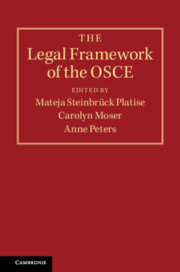Book contents
- The Legal Framework of the OSCE
- The Legal Framework of the OSCE
- Copyright page
- Contents
- Contributors
- Preface
- Abbreviations
- Part I Introduction
- Part II The Quest for International Legal Personality
- Part III Manifestations of the Legal Position under International Law
- Part IV The Legal and Institutional Framework as a Governance Issue
- Part V Conclusions
- Index
- References
Part II - The Quest for International Legal Personality
Published online by Cambridge University Press: 15 August 2019
- The Legal Framework of the OSCE
- The Legal Framework of the OSCE
- Copyright page
- Contents
- Contributors
- Preface
- Abbreviations
- Part I Introduction
- Part II The Quest for International Legal Personality
- Part III Manifestations of the Legal Position under International Law
- Part IV The Legal and Institutional Framework as a Governance Issue
- Part V Conclusions
- Index
- References
- Type
- Chapter
- Information
- The Legal Framework of the OSCE , pp. 27 - 132Publisher: Cambridge University PressPrint publication year: 2019
References
References
References
References
References
Erler, Gernot, ‘Speech by the Minister of State in the Federal Foreign Office at the OSCE Ministerial Council in Brussels’, MC.DEL/22/06, 4 December 2006.
Kahlweit, Cathrin, ‘Zwischen den Zeilen des Minsker Abkommens’, Sueddeutsche Zeitung (12 February 2015).



